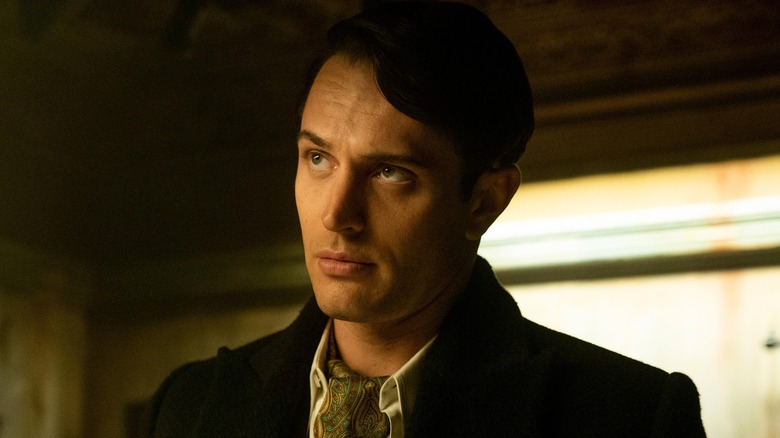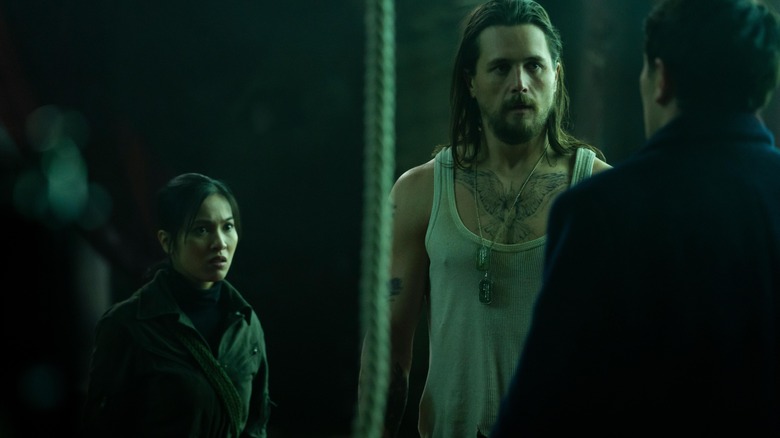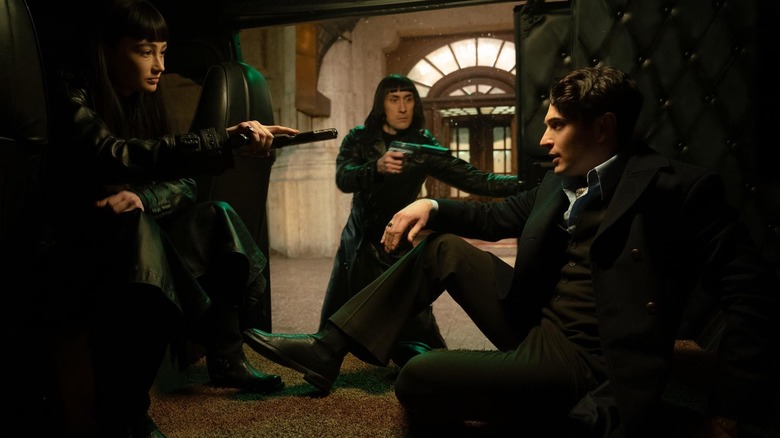The Continental Review: A Lifeless, Joyless, And Ultimately Pointless Return To The Wick-Verse
They should've left him alone. In 2014's "John Wick," unsuspecting audiences watched in slack-jawed delight as Keanu Reeves announced that he was back and better than ever as the eponymous assassin with a well-founded grudge and an ungodly talent for headshots. What followed has to be considered one of the last decade's greatest success stories: an original action franchise that organically built up its fanbase on the strength of a bona fide movie star. This initially straightforward revenge story, kicked off when Alfie Allen and his goons picked the wrong car to steal and the wrong dog to kill, gradually revealed itself as a downright mythological fable that came to a fitting and (mostly) definitive end with this year's "John Wick: Chapter 4."
So, it should go without saying that any further attempt at building out the world of Wick ought to have learned an important lesson or two from what those deeply unlucky Russian mobsters failed to do all those years ago — take a deep breath, ask themselves if this is a legend truly worth messing with, and carefully weigh the consequences before walking away with their reputations intact and unharmed.
That's what makes it so disappointing that Peacock and Lionsgate's "The Continental," the breathlessly-hyped "three-part event" detailing the origins of the famed Continental hotel and the rise of one Winston Scott (the enigmatic hotel manager portrayed by the great Ian McShane in the films), fares just about as well as any misbegotten character who presumed they could outsmart or outgun John Wick. Developed by Greg Coolidge, Kirk Ward, and Shawn Simmons, this prequel story clearly aims to take advantage of the appeal and seductive storytelling potential of the world-building first created by the trio of Chad Stahelski, David Leitch, and Derek Kolstad, all of whom serve as executive producers on this project. On paper, at least, it's easy to see why increasingly IP-obsessed executives thought this would be a surefire hit ... even as the final results tell a very different story.
What nobody involved seems to have realized, unfortunately, is that the relatively low reward of maintaining the brand simply wasn't worth the high risk of watering down a fan-favorite franchise.
Setting the stage
Set in 1970s New York City, the premiere wastes no time reintroducing us to a wildly different version of the buttoned-down hotel audiences have grown used to. In a flashy one-shot sequence following a character named Frankie (Ben Robson), we're taken through the depths of the Continental and confronted by a much more uninhibited and hedonistic clientele of assassins and criminals. All this serves as a prelude to the heist that jumpstarts the plot in earnest: Frankie, revealed to be Winston's troubled older brother, stages a brazen theft of an invaluable coin press machine (an object described as capable of toppling the entire Continental, somehow) in one of the more improbable and absurd set pieces in the franchise — one that ostensibly sets the events of the series in motion, but which mostly just provides an excuse to put Frankie in a patented, Wick-like firefight against hordes of foes at once. Having brought down the wrath of kingpin and current hotel manager Cormac upon him (a shockingly miscast and wildly unmodulated Mel Gibson, whose inclusion in the show simply doesn't justify the controversy), Frankie's actions also have the side-effect of dragging estranged brother Winston back into the underworld that he thought he'd escaped as a child.
Colin Woodell, undeniably the highlight of the series, makes an immediate impression as the young, "smooth-talker" version of Winston who's more business-minded, womanizing, and brazen than we've ever seen him before. Ayomide Adegun also takes over capably for the late Lance Reddick as the concierge Charon, who similarly shines once the storyline pivots to become more of a Winston/Charon dual origin story. But the same can't be said for the rest of the supporting cast. When Winston gathers a team together to help in his fight against Cormac, the brother/sister duo of Hubert Point-Du Jour as a gunrunner named Miles and Jessica Allain as the emotionally-conflicted Lou are among his first allies. This material is never quite given the space to round into shape, frustratingly, much like another dragging subplot involving police detectives KD (Mishel Prada) and Mayhew (Jeremy Bobb) staging their own investigation into the Continental.
Nhung Kate as Frankie's wife Yen and Katie McGrath as the half-masked Adjudicator help flesh out the world as best they can, though their efforts are almost completely undone by the additions of Mark Musashi as Hansel and Marina Mazepa as Gretel, a silent pair of assassin twins who might very well earn the title of most obnoxious characters in the entire franchise.
A watered-down world
Yet for all its efforts and despite the tremendous amount of resources that have been poured into the production (a sizable amount of which seems to have been spent on endless, on-the-nose needle drops), "The Continental" never quite manages to overcome its most imposing obstacle to success. With every new corner it explores in the Wick-verse, the series can't help but drain the entire world of the mystique and mystery that the movies so carefully fostered and shatter the infinitely fragile illusion of such a timeless setting. Let's put it this way: a unique atmosphere ruled by nameless Adjudicators, a (mostly) unseen High Table, and very little interest in how an inexplicably vast underground society of assassins exists alongside the real world can't really sustain reference-heavy dialogue acknowledging David Bowie, Casper the Friendly Ghost, and, most egregiously of all, the implication that every civilian in the vicinity of the Continental knows something shady is going on.
Simply put, "The Continental" never quite lives up to the astronomically high standards set by its more cinematic predecessors — a comparison the show itself repeatedly invites with distracting references to the movies at every turn, even as it simultaneously attempts to forge its own identity.
No amount of aping the style, camera work, and rhythm of the vastly superior gunfights and action sequences in the "Wick" movies quite makes up for the fact that "The Continental" is fighting with one arm tied behind its back. Absent characters as memorable and charismatic as Wick himself, the series instead doubles down on an edgier tone and more gratuitous mean streak. (Every F-bomb and sex scene, of which there are more in the first episode alone than in all four movies combined, somehow only makes this adult-oriented series feel more and more juvenile). Gone are any of the movies' trademark sense of wry humor, tongue-in-cheek winks and nods, or basically any other humanizing emotion that prevented this franchise from taking itself way too seriously. In its place is a dour, poorly-lit, and oftentimes humorless slog that makes viewers feel every second of each episode's roughly 90-minute runtime.
"You're a shell of yourself," the Adjudicator accuses of Cormac early in the series. In the micro, she's referring to the aged manager's inability to maintain control of his own hotel stronghold after Frankie's betrayal. In the macro, however, she might as well be describing the sorry state of the "John Wick" franchise in a world where even this highly-prized golden goose of a property can end up with a plodding, corporate-mandated, and utterly unnecessary prequel origin story. The legacy of the movies should ultimately endure even a misstep as ill-advised as this one. But, if nothing else, at least a series like "The Continental" can inadvertently remind us to appreciate what we had all along.
/Film Rating: 4.5 out of 10
Each of the three episodes of "The Continental" stream weekly on Peacock, beginning with the premiere on Friday, September 22.


